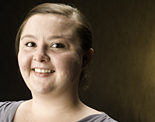
Rachael Lucero
Las Vegas, N.M. — A New Mexico Highlands University biology/chemistry double major completed a bioremediation study that holds promise as a new method for cleansing water contaminated with copper.
Rachael Lucero won the top award at the university’s Research Day 2012 competition for her research on using a copper-resistant bacterial strain found in the pit lake of the abandoned Nacimiento copper mine near Cuba, N.M. to help remove copper from water.
“Biochar is a super-heated charcoal like substance made from organic material that has been used for centuries to enhance soil and crop growth,” said microbiology professor Richard Plunckett, Lucero’s adviser for the study. “Rachael investigated the new idea of using biochar from local sources to stimulate bacteria to help cleanse contaminated water. She designed an elegant and simple study that answered an important scientific question with clarity.”
Lucero’s study used pinon tree biochar from the Picuris Pueblo’s forest thinning project.
“We know how to clean up toxic contamination but the solutions are extremely expensive,” Plunkett said. “Rachael’s study lays the groundwork for further research on low-tech, low-cost remediation that can be done onsite.”
The 22-year-old Las Vegas, N.M. native worked with Plunkett to design a study that combined her knowledge of chemical compounds with microbes studied in biology.
“Copper contamination in water sources is a big environmental problem because high levels of copper are extremely toxic,” Lucero said. “Some bacteria are able to survive in highly contaminated environments. I studied a copper-resistant bacterial strain that Daniel Delgado extracted from the pit lake at the Nacimiento copper mine.”
Delgado, who will graduate this year from Highlands with a master’s degree in biology, was the first to study the microbiology of the pit lake. He isolated 12 copper-resistant bacteria, which are maintained in Plunkett’s research lab.
Lucero’s study involved passing a copper solution through a gravity column, a tall glass tube sealed at the bottom. The columns were filled with sterile sand and the live bacteria, with some also containing the pinon biochar.
“In the gravity columns with the bacteria and biochar, there was a significant decrease of copper in the solution,” Lucero said. “This study shows the effectiveness of using biochar to increase microbial activity for bioremediation.”
“Rachael is impressive, with great potential as a research scientist,” Plunkett said.
This isn’t Lucero’s first research honor. In 2010, she was selected for a summer chemistry research internship at the University of Washington – Seattle. Highlands University chemistry professor Tatiana Temofeeva secured the National Science Foundation grant that funded six such internships for her chemistry students.
“I studied organic solar cells comprised of chemicals that can absorb light,” Lucero said. “Solar cells are currently made of silica, which is expensive and bulky. The new organic solar cell technology will lead to thin solar cells.”
At Highlands, Lucero has also worked in chemistry researcher Rodolfo Martinez’ laboratory. He directs the university’s project for Building the Biomedical Research Infrastructure funded by the National Institutes of Health.
“There are so many amazing opportunities for science research at Highlands, even for undergraduates like me,” Lucero said. “The biology and chemistry professors are super knowledgeable, helpful and supportive. You can tell they enjoy teaching and mentoring students.
“Dr. Plunkett is very organized in his lab and helps keep you on track toward your research goal. He’s also compassionate and reaffirms your faith in yourself,” Lucero said.
In addition to her rigorous science courses and research, for the last year Lucero has helped her mother care for her three teenage sisters while her stepfather was deployed in Afghanistan as a New Mexico National Guard medic. He returned in April.
“It’s a huge relief to have him home safely,” Lucero said.
Looking ahead, Lucero plans to complete her master’s degree in chemistry at Highlands and perhaps pursue a Ph.D.
“Research is exhilarating and I definitely want to be a researcher,” Lucero said. “I’m interested in studying new pharmaceuticals for cancer treatment.”
